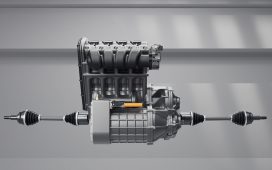
Over the years, we’ve seen several car companies tout their decision to create an “EV division” within the company, a group tasked specifically with looking into EV technology and how to implement that within the product line.
But many times, this can still be counterproductive. With the EV shift happening now, companies need to stop thinking about “EV divisions” and start going all-in on EVs at every level.
Last week, we heard news of Toyota establishing a new “EV role” in North America. Many took this as a positive, given Toyota’s long history of anti-EV advocacy.
It certainly could signal a change since Toyota has somewhat softened that anti-EV stance in recent years, notably with the resignation of its former CEO and replacement with a purportedly more pro-EV successor.
But sometimes these EV divisions turn into an attempt to silo EV thinking into a part of the company that can be easily ignored.
For example, BMW had an early lead on EVs with the original MINI E and ActiveE projects, leading to the BMW i3, one of the first ground-up EVs developed by any company. The i3 and the i8 were part of BMW’s “Project i” division, a separate unit meant to focus on electric mobility.
The division languished under CEO Harald Kruger, who came into the company with a mission to improve BMW’s EV projects but met resistance from company executives and was unable to make much progress on that front, leading to his resignation in 2019. In this case, having a separate division made it easier for the company to continue its old ways of thinking without integrating electrification fully into the product line.
It doesn’t have to be like this. Ford did a similar thing when it split off a separate “Team Edison” to focus on EV programs, and it worked quite well. Ford shipped the Mustang Mach-E only about four years after Team Edison was established – impressively quick in terms of vehicle development timelines, which are generally around seven years long.
But even Ford’s effort needs to be stronger given where we are in the timeline of industry electrification and where companies need to be by the next decade.
60% EV by 2030 means companies must plan majority EV now
The EPA recently announced rules targeting 60% EV sales by 2030. Given the aforementioned seven-year development timeline, this means that 60% of cars going into development today, mid-2023, with less than seven years left until 2030, need to be electric. This doesn’t just apply to light-duty vehicle sales, either, as US and California governments are implementing strong truck regulations as well.
If a majority of vehicles going into development today need to be electric, then a separate “EV division” isn’t going to cut it. The whole company needs to put its main focus on electric. There is still room for potential side projects to salvage whatever small niches gas engines might continue to fill come next decade, but more effort needs to go into EVs than into gas at this point, rather than the other way around.
We did some similar math two years ago when we declared that it would be easy for any company to end gas car sales by 2035. In 2021, all a company would need to do to end gas car sales by 2035 is just stop greenlighting new gas car projects – even if they changed none of their development plans and continued developing and selling the models they were already working on at the time.
This is not just a necessity due to individual government regulations, but given where we are in the climate crisis, urgent action is needed. Continuing to sell fossil-powered vehicles well into the next decade, which will continue polluting for a decade or more after they’re put on the road, is not what the world needs right now.
And so establishing a separate EV division is simply not enough. What Toyota and everyone else need to do is put the company’s primary focus on electrification, starting now, if they want to have any chance of making it through the next decade.
FTC: We use income earning auto affiliate links. More.










